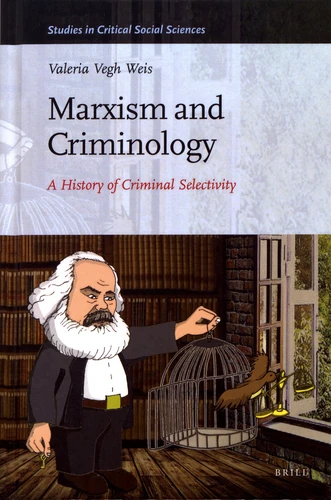Marxism and Criminology. A History of Criminal Selectivity
Par :Formats :
- Paiement en ligne :
- Livraison à domicile ou en point Mondial Relay estimée à partir du 5 décembreCet article sera commandé chez un fournisseur et vous sera envoyé 10 jours après la date de votre commande.
- Retrait Click and Collect en magasin gratuit
- Livraison à domicile ou en point Mondial Relay estimée à partir du 5 décembre
- Nombre de pages348
- PrésentationRelié
- FormatGrand Format
- Poids0.669 kg
- Dimensions16,4 cm × 24,2 cm × 2,7 cm
- ISBN978-90-04-31955-4
- EAN9789004319554
- Date de parution02/03/2017
- CollectionStudies in Critical Social Sci
- ÉditeurBrill
Résumé
In Marxism and Criminology : A History of Criminal Selectivity, Valeria Vegli Weis rehabilitates the contributions and the methodology of Marx and Engels to analyze crime and punishment through the development of capitalism (15th century to the present) in Europe and the United States. The author puts forward the concepts of over-criminalization and under-criminalization to show that criminal justice has always been selective.
Criminal unfairness, the book argues, has been an inherent element of the founding and reproduction of a capitalist society. In a moment in which racial profiling, prosecutorial discretion, and mass incarceration do not find easy answers, Vegh Weis invites us to revisit Marx and Engels' contributions to identify socio-economic and historic patterns of crime and punishment in order to foster transformative changes to criminal justice.
The book includes a Foreword by Professor Roger Matthews of Kent University, and an Afterword written by Professor Jonathan Simon of the University of California, Berkeley.
Criminal unfairness, the book argues, has been an inherent element of the founding and reproduction of a capitalist society. In a moment in which racial profiling, prosecutorial discretion, and mass incarceration do not find easy answers, Vegh Weis invites us to revisit Marx and Engels' contributions to identify socio-economic and historic patterns of crime and punishment in order to foster transformative changes to criminal justice.
The book includes a Foreword by Professor Roger Matthews of Kent University, and an Afterword written by Professor Jonathan Simon of the University of California, Berkeley.
In Marxism and Criminology : A History of Criminal Selectivity, Valeria Vegli Weis rehabilitates the contributions and the methodology of Marx and Engels to analyze crime and punishment through the development of capitalism (15th century to the present) in Europe and the United States. The author puts forward the concepts of over-criminalization and under-criminalization to show that criminal justice has always been selective.
Criminal unfairness, the book argues, has been an inherent element of the founding and reproduction of a capitalist society. In a moment in which racial profiling, prosecutorial discretion, and mass incarceration do not find easy answers, Vegh Weis invites us to revisit Marx and Engels' contributions to identify socio-economic and historic patterns of crime and punishment in order to foster transformative changes to criminal justice.
The book includes a Foreword by Professor Roger Matthews of Kent University, and an Afterword written by Professor Jonathan Simon of the University of California, Berkeley.
Criminal unfairness, the book argues, has been an inherent element of the founding and reproduction of a capitalist society. In a moment in which racial profiling, prosecutorial discretion, and mass incarceration do not find easy answers, Vegh Weis invites us to revisit Marx and Engels' contributions to identify socio-economic and historic patterns of crime and punishment in order to foster transformative changes to criminal justice.
The book includes a Foreword by Professor Roger Matthews of Kent University, and an Afterword written by Professor Jonathan Simon of the University of California, Berkeley.


